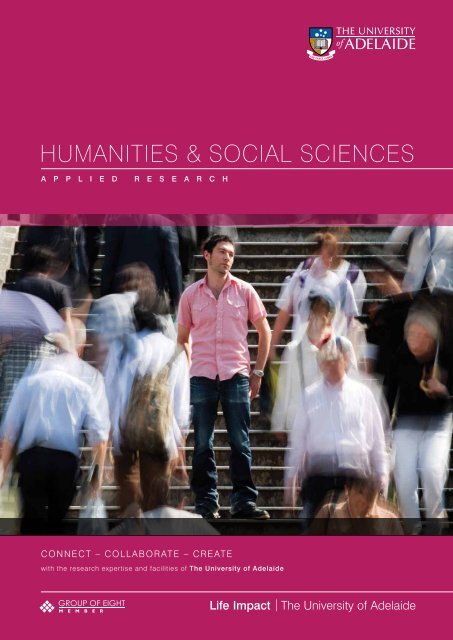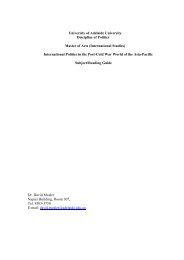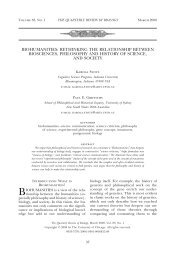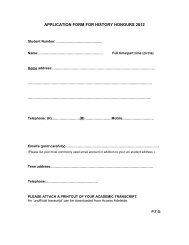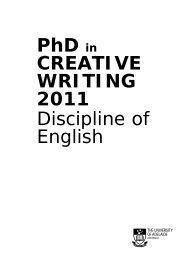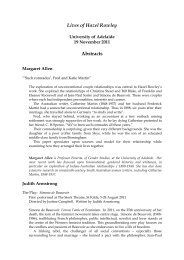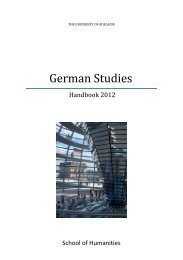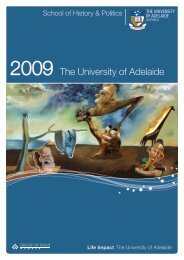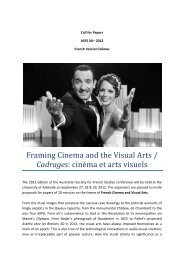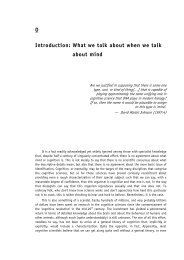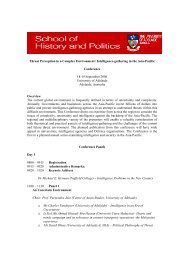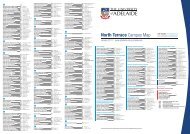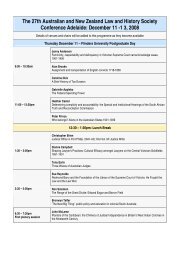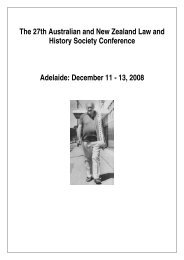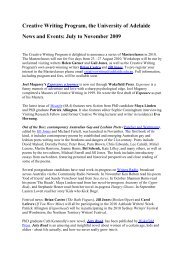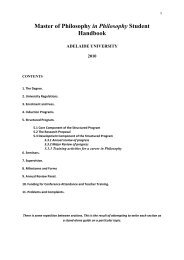applied research brochure - Faculty of Humanities & Social ...
applied research brochure - Faculty of Humanities & Social ...
applied research brochure - Faculty of Humanities & Social ...
Create successful ePaper yourself
Turn your PDF publications into a flip-book with our unique Google optimized e-Paper software.
<strong>Humanities</strong> & <strong>Social</strong> Sciences<br />
A P P L I E D R E S E A R C H<br />
CONNECT – COLLAB ORATE – CREATE<br />
with the <strong>research</strong> expertise and facilities <strong>of</strong> The University <strong>of</strong> Adelaide
FACULTY OF HUMANITIES AND SOCIAL SCIENCES<br />
INTRODUCTION<br />
Our ability to develop and sustain valuable resources relies<br />
The <strong>Faculty</strong> <strong>of</strong> <strong>Humanities</strong> and <strong>Social</strong> Sciences understands the<br />
on how well we respond to major issues, such as climate change,<br />
key role played by informed decision making in social policy and<br />
ageing population, migration, social diversity and inclusion, social<br />
planning and the advancement <strong>of</strong> communities.<br />
factors which impact on health outcomes, changes in media<br />
and technologies, performance <strong>of</strong> global financial infrastructure,<br />
energy demands, access to natural resources, food security,<br />
and regional politics.<br />
These challenges intersect with the <strong>research</strong> capabilities <strong>of</strong> the University <strong>of</strong><br />
Pr<strong>of</strong>. Nick Harvey<br />
Executive Dean<br />
Simon Ladd<br />
Research Development Manager<br />
Our clients and partners are faced with challenges in a range <strong>of</strong> areas,<br />
including environmental needs and access to natural resources, integrated<br />
planning for urban renewal and housing, infrastructure provision and related<br />
impacts on regional economies and potential social outcomes, provision <strong>of</strong><br />
suitable health services, and managing social inclusion in times <strong>of</strong> change.<br />
Adelaide, which continues to enhance its <strong>research</strong> performance by investing<br />
in excellence, attracting high quality <strong>research</strong>ers and providing training,<br />
opportunities and industry engagement for the next generation <strong>of</strong> <strong>research</strong>ers.<br />
The <strong>Faculty</strong> <strong>of</strong> <strong>Humanities</strong> and <strong>Social</strong> Sciences in particular, continues to lead<br />
in provision <strong>of</strong> <strong>research</strong> for evidenced-based social innovation.<br />
M: +61 (0)457 549 748<br />
E: simon.ladd@adelaide.edu.au<br />
While facing these challenges, people can also be confronted with<br />
uncertainties arising from a lack <strong>of</strong> available and purposeful information.<br />
We provide flexible, holistic <strong>research</strong> services to develop data, and analyse<br />
and clarify issues with balance, objectivity, passion and expertise.<br />
Whether looking for information to help set strategic direction, refine or reaffirm<br />
I welcome this opportunity to give you an insight into concentrations <strong>of</strong><br />
<strong>research</strong> excellence within the <strong>Faculty</strong>. The examples below illustrate a proven<br />
track record <strong>of</strong> industry engagement undertaken by <strong>research</strong>ers currently at<br />
the University <strong>of</strong> Adelaide in the <strong>Faculty</strong> <strong>of</strong> <strong>Humanities</strong> and <strong>Social</strong> Sciences.<br />
policy, develop service delivery programs, understand important emerging<br />
trends or wanting to add to a body <strong>of</strong> knowledge, the <strong>Faculty</strong> <strong>of</strong> <strong>Humanities</strong><br />
and <strong>Social</strong> Sciences facilitates the process through provision <strong>of</strong> relevant, high<br />
quality <strong>research</strong> and judicious problem solving support.<br />
Each insight describes <strong>applied</strong> <strong>research</strong> undertaken for clients and<br />
partners in the fields <strong>of</strong>:<br />
We do this by bringing your needs together with:<br />
• Highly regarded <strong>research</strong>ers equipped with global knowledge networks and best<br />
• demography, population and migration<br />
practice analysis methodologies<br />
• housing, urban and regional planning<br />
• Contract management and project development frameworks<br />
• workforce and industry trends<br />
• regional and global governance<br />
• public health information<br />
• A tradition and culture <strong>of</strong> customer satisfaction and quality service delivery<br />
• A supportive environment <strong>of</strong> pr<strong>of</strong>essional development, inquiry and interaction<br />
• geographical and environmental studies<br />
• media and communications in health, social change and development<br />
• linguistics <strong>of</strong> endangered and migrant languages<br />
• sustainable communities and socio-economic impact assessment<br />
• native title and heritage assessment<br />
• gender studies<br />
• social inlusion<br />
• creative practice<br />
2
FACULTY OF HUMANITIES AND SOCIAL SCIENCES<br />
Population and Migration<br />
Population issues and migration are fundamental to the nation’s economy,<br />
society and security. Our <strong>research</strong> provides an evidence base for better<br />
practice in population management needs, immigration and development<br />
and to provide insight into national and international policy development.<br />
We analyse population issues and their<br />
implications, migration theory and spatial<br />
information regarding:<br />
• International migration and linkages<br />
to population policy<br />
• Population, ageing and workforce<br />
development<br />
• Migration in Australia and the<br />
Asia- Pacific region<br />
• Adaptation and infrastructure<br />
• Regional economic integration<br />
Key Researchers<br />
Pr<strong>of</strong>. Graeme Hugo, Dr Dianne Rudd,<br />
Dr Douglas Bardsley, Dr Kevin Harris,<br />
Dr Kelly Parker, Assoc. Pr<strong>of</strong>. Chris Beasley,<br />
Dr Rob Cover, Dr. Megan Warin,<br />
Dr Peter Mickan<br />
Key Clients/Partners<br />
Federal and State Government Departments,<br />
Global Food Companies, International<br />
Statutory Authorities, Aid Agencies and<br />
International Development Banks<br />
Our multi-disciplinary team is identifying<br />
behaviour influencing the eating and<br />
exercise patterns <strong>of</strong> baby boomers<br />
using a high quality set <strong>of</strong> quantitative<br />
and qualitative data.The emphasis is<br />
on potential key intervention points and<br />
providing policy makers with evidence and<br />
guidance for targeted interventions.<br />
Pr<strong>of</strong>. Graeme Hugo<br />
Director, <strong>of</strong> the National Centre for <strong>Social</strong> Applications<br />
<strong>of</strong> Geographical Information Systems<br />
“Obesity in Australia is greater among<br />
baby boomers than other groups and if<br />
not reduced will compromise their ability<br />
to remain in the workforce and increase<br />
per capita demand for health services in<br />
old age.” Pr<strong>of</strong>. Graeme Hugo<br />
KEY PROJECTS<br />
International Migration to and from Australia, Dimensions, Causes and Implications<br />
Australia’s Baby Boomer Generation Obesity and Work Patterns, Causes and Implications<br />
Preventing Obesity Among Socioeconomically Disadvantaged Women and Children<br />
International Population Movements in the Asia-Australia Region<br />
Addressing climate change in Asia and the Pacific: Climate change and Migration<br />
Media representations <strong>of</strong> population, globalisation and climate change<br />
Representations <strong>of</strong> minorities and ageing<br />
Biopolitics, identity/subjectivity and population concepts<br />
Climate change and migration in China: theoretical, empirical and policy dimensions<br />
4
FACULTY OF HUMANITIES AND SOCIAL SCIENCES<br />
Housing, Urban and Regional Planning<br />
Our work supports decision making for addressing housing market<br />
imbalances and inefficiencies and reducing homelessness. We also<br />
examine the contemporary imperatives and challenges for regional<br />
economic development, and its relationship with international<br />
growth processes.<br />
Empowering leadership is fundamental to<br />
the growth and revitalisation <strong>of</strong> regional<br />
and urban communities, playing an<br />
important role in encouraging innovation<br />
and the growth <strong>of</strong> new industries.<br />
Pr<strong>of</strong>. Andrew Beer<br />
Director, Centre for Housing, Urban and Regional Planning<br />
We deliver needs analysis, evaluation<br />
and recommendations for:<br />
• Regional governance frameworks for<br />
economic development<br />
• Regional needs, leadership, strategic<br />
planning and innovation<br />
• Regional capability and economic<br />
development strategy<br />
• Regional programs evaluation<br />
• Low income household energy<br />
programs<br />
• Migration pressure on housing in<br />
urban environments<br />
• Homelessness and new arrivals<br />
housing policy and programs<br />
• Urban planning and development<br />
• Housing for older Australians<br />
• Housing for persons with a disability<br />
• Housing, health and the human<br />
environment<br />
• Indigenous housing tenure<br />
and management<br />
• Sustainable accommodation and<br />
support programs including rental<br />
assistance<br />
• Sustainable accommodation and<br />
civic participation<br />
Key Researchers<br />
Pr<strong>of</strong>. Andrew Beer, Dr Emma Baker,<br />
Dr Selina Tually, Dr Debbie Faulkner,<br />
Dr Jennifer Bonham, Dr Susan Oakley,<br />
Dr Doug Bardsley, Dr Melissa Nursey-Bray,<br />
Pr<strong>of</strong>. Barry Burgan, Assoc. Pr<strong>of</strong>. Alaric Maude<br />
Key Clients/Partners<br />
State and Commonwealth Government<br />
Agencies, Industry and Regional Development<br />
Groups and Boards, Community Information<br />
Service, Community Associations,<br />
an Economic Development Authority<br />
and Local Government Associations<br />
KEY PROJECTS<br />
Land Capability Audit for the Mid North <strong>of</strong> South Australia<br />
Delivery <strong>of</strong> Property, Planning and Economic Development Information to<br />
Regional South Australia<br />
Economic and Infrastructure Audit <strong>of</strong> the Central and Western Murray Region<br />
Governance and the Organisation <strong>of</strong> Economic Development in Five Nations<br />
Interim South East Development Strategy<br />
Effectiveness <strong>of</strong> State Frameworks for Delivering Local Economic Development<br />
Stimulating innovation in regional economies: the roles <strong>of</strong> local and central agency<br />
Evaluation <strong>of</strong> the Northern Advanced Manufacturing Industry Group’s<br />
Concept2Creation Program<br />
Urban and regional growth amongst Australia’s regional cities<br />
<strong>Social</strong> Inclusion, Disability and Housing<br />
The Housing Markets <strong>of</strong> Rural and Regional Centres in Australia<br />
The Drivers <strong>of</strong> Supply and Demand in Rural and Regional Centres<br />
KEY PROJECTS continued<br />
Human Dimensions <strong>of</strong> Environmental Decision Making<br />
A Regional Climate Change Decision Framework for Natural Resource Management<br />
The Health and Wellbeing Impacts <strong>of</strong> Different forms <strong>of</strong> Housing Policy<br />
The Housing Of Older South Australians<br />
Disability and Homelessness in Australia<br />
Creating better pathways into civic participation for young homeless people through<br />
sustainable accommodation and support program models<br />
6
FACULTY OF HUMANITIES AND SOCIAL SCIENCES<br />
21 st Century Workforce<br />
Understanding the impact <strong>of</strong> issues such as demographic change, aspirations<br />
and ageing on the workforce, to ensure the availability <strong>of</strong> suitably qualified,<br />
skilled and energetic employees, is one <strong>of</strong> the most significant workforce<br />
challenges facing government and industry in Australia.<br />
Our <strong>research</strong> provides key insights into<br />
workforce and industry trends to inform<br />
workforce development and planning,<br />
policy analysis and evaluations for:<br />
• Employment and return-to-work<br />
programs<br />
• Workers compensation<br />
• Residential and community aged care<br />
and service provision<br />
• Nursing, teaching and support<br />
staff planning, nurse patient<br />
communication, training overseas<br />
doctors in Australian medical<br />
discourses<br />
• Mental health services<br />
• Services for migrants<br />
• Vocational education and training<br />
• <strong>Social</strong> inclusion and equity issues in<br />
employment (disability employment<br />
pathways, Aboriginal communities,<br />
young people, older people,<br />
culturally specific sectors)<br />
• Programs and services for<br />
aboriginal people<br />
• Literacy and numeracy demands <strong>of</strong><br />
changing workplaces<br />
• Workplace communication for<br />
migrant and refugee workers<br />
Key Researchers<br />
Assoc. Pr<strong>of</strong>. John Spoehr,<br />
Dr Kate Barnett, Mr Simon Molloy,<br />
Dr Ann-Louise Hordacre, Dr Rasika<br />
Ranasinghe, Ms Naomi Guiver,<br />
Ms Rachel Katteri, Dr Keri Chiveralls,<br />
Dr Peter Mickan, Ms Nayia Cominos,<br />
Dr John Walsh<br />
Key Clients/Partners<br />
Commonwealth and State Government<br />
Agencies, Statutory Corporations, an<br />
International Population Fund, and<br />
Private Industry<br />
KEY PROJECTS<br />
Mature age employment<br />
Evaluation <strong>of</strong> the Return to Work Fund<br />
Whole <strong>of</strong> Education Sector Teacher Workforce Planning<br />
The role <strong>of</strong> the workplace in the return to work<br />
Through successful partnerships between<br />
<strong>research</strong>, industry and government we are<br />
better modelling and anticipating workforce<br />
supply and demand needs and pressures<br />
facing specific sectors, such as mining or<br />
teaching, or facing specific regions.<br />
Dr Kate Barnett<br />
Deputy Executive Director, Centre for Labour Research<br />
8
FACULTY OF HUMANITIES AND SOCIAL SCIENCES<br />
GOVERNANCE<br />
Within political and policy communities there is growing awareness<br />
that effective responses to complex social, economic, and technological<br />
issues now depend on the formulation and implementation <strong>of</strong> new forms<br />
<strong>of</strong> governance. Our analysis <strong>of</strong> regional and global governance needs,<br />
develops understanding <strong>of</strong> the drivers for change.<br />
The emphasis <strong>of</strong> our <strong>research</strong> agenda<br />
is on transformation and innovation in<br />
political and social governance, where<br />
new governance solutions underline the<br />
complexities <strong>of</strong> providing public goods<br />
in a multi-layered global order.<br />
We provide <strong>research</strong> and<br />
recommendations regarding:<br />
• Coastal governance and science<br />
uptake in coastal cities<br />
• Global distributive and political justice<br />
• Global financial regulatory challenges<br />
• Human, environmental, food and<br />
water security<br />
• Population and migration pressures,<br />
and the governance <strong>of</strong> migration<br />
• Climate change and adaptation<br />
(especially in relation to coastal,<br />
freshwater and land management<br />
systems)<br />
• Policy frameworks to develop<br />
and maintain resilience within<br />
social-environmental systems<br />
• Australian relations with Asia and<br />
the resulting political and economic<br />
challenges for governance in the<br />
“Asian Century”<br />
• Legal and governance reform<br />
• Transport (e.g. shipping), energy<br />
needs and resource allocation<br />
• Regulation for new technologies<br />
and eGovernance<br />
• Gendered modes <strong>of</strong> governance,<br />
policies and modes <strong>of</strong> governance<br />
in community and institutional<br />
contexts<br />
• Gender equality and institutional<br />
reform<br />
• Health and governance<br />
• <strong>Social</strong> inclusion, social policy<br />
and governance<br />
Key Researchers<br />
Pr<strong>of</strong>. Kanishka Jayasuriya, Pr<strong>of</strong>. Nick Harvey,<br />
Dr Tiziana Torresi, Dr Andrew Rosser,<br />
Pr<strong>of</strong>. Tim Doyle, Dr John Tibby,<br />
Pr<strong>of</strong>. Carol Johnson, Pr<strong>of</strong>. Graeme Hugo,<br />
Dr Douglas Bardsley, Assoc. Pr<strong>of</strong>. Rachel<br />
Ankeny, Assoc. Pr<strong>of</strong>. Christine Beasley,<br />
Assoc. Pr<strong>of</strong>. Mary Griffiths, Dr Andrew Skuse,<br />
Ms Jane Kernot, Pr<strong>of</strong>. Purnendra Jain,<br />
Pr<strong>of</strong>. Margaret Allen, Pr<strong>of</strong>. Gregory McCarthy,<br />
Dr Rob Cover, Dr Alison Dundon<br />
Key Clients/Partners<br />
International Financial Institutions, Aid Agencies,<br />
Federal and Local Governments, State<br />
Government Agencies, International<br />
Development Agencies, A Global Mining<br />
Company, A Regional Investment Planner,<br />
A Sultan, An International Commission,<br />
Overseas Tertiary Education and Research<br />
Institutions, Major Resource Management Boards<br />
Pr<strong>of</strong>. Kanishka Jayasuriya<br />
Director, The Indo Pacific Governance Research Centre<br />
KEY PROJECTS<br />
Challenges to Global Co-operation and Security in the 21st Century<br />
Energy and Nuclear Security in Iran and the Indian Ocean Region<br />
Global Fisheries Management and Security in the Middle East<br />
Water Security in the Indian Ocean Region<br />
Climate Change Policies for the Global South<br />
The politics <strong>of</strong> pro-poor basic services in Indonesia<br />
Leaders, elites and coalitions: the politics <strong>of</strong> free basic services in decentralised Indonesia<br />
Timor Leste’s Vulnerability to the Resource Curse: An Assessment<br />
Corporate <strong>Social</strong> Responsibility in Indonesia: Options and Constraints<br />
Addressing climate change in Asia and the Pacific: Climate change and Migration<br />
A regional climate change decision framework for natural resource management<br />
A comparative study <strong>of</strong> in situ agro biodiversity conservation in Switzerland,<br />
Turkey and Nepal<br />
Modes <strong>of</strong> health governance in hospitals<br />
10<br />
Modes <strong>of</strong> sexual health policy and service delivery
FACULTY OF HUMANITIES AND SOCIAL SCIENCES<br />
Public health information<br />
The University develops and produces publication <strong>of</strong> integrated<br />
health information, systems and indicators for a broad range <strong>of</strong> health<br />
determinants and targeted area statistics for:<br />
• monitoring inequality in health and<br />
wellbeing<br />
• underpinning social inclusion policy<br />
Key Researchers<br />
Assoc. Pr<strong>of</strong>. John Glover,<br />
Dr Diana Hetzel, Dr Fearnley Szuster<br />
A major emphasis is on the<br />
development and publication <strong>of</strong> small<br />
area statistics for monitoring inequality<br />
in health and wellbeing.<br />
Assoc. Pr<strong>of</strong>. John Glover<br />
Director, Public Health Information Development Unit<br />
• use <strong>of</strong> services<br />
• socio-economic policy needs<br />
(in education, labour force,<br />
housing, etc)<br />
Key Clients/Partners<br />
Commonwealth Department<br />
“We are committed to the development <strong>of</strong><br />
an integrated health information system<br />
in Australia that can provide information<br />
on a broad range <strong>of</strong> health determinants<br />
across the life course.”<br />
Assoc. Pr<strong>of</strong>. John Glover<br />
KEY PROJECTS<br />
<strong>Social</strong> Health Atlas <strong>of</strong> Australia<br />
Please note: The <strong>Faculty</strong> <strong>of</strong> <strong>Humanities</strong> and <strong>Social</strong> Sciences also actively <strong>research</strong>es<br />
more broadly in public health fields such as sexual health, youth mental health needs,<br />
and eating disorders. For example, refer herein to sections regarding 21st Century<br />
Workforce, Gender, and Media and Communications in Health, <strong>Social</strong> Change<br />
and Development.<br />
12
FACULTY OF HUMANITIES AND SOCIAL SCIENCES<br />
Media and Communications in Health,<br />
<strong>Social</strong> Change and Development<br />
We need to use new communication technologies and better understand<br />
the role and potential <strong>of</strong> communication to assist in preventative health<br />
care, community empowerment and development, especially to help<br />
those who are most vulnerable in society.<br />
Our <strong>research</strong> influences the potential<br />
and effectiveness <strong>of</strong> media and<br />
communications in relation to:<br />
• Preventative health care<br />
• Health and behaviour change<br />
• Socio-economic development<br />
• Poverty and social change<br />
• Conflict and culture<br />
• Digital media, intellectual property,<br />
governance, citizenship and rights<br />
Key Researchers<br />
Dr Andrew Skuse, Dr Mike Wilmore,<br />
Dr Sal Humphreys, Dr Alison Dundon,<br />
Assoc. Pr<strong>of</strong>. Christine Beasley, Dr Rob Cover,<br />
Dr Ros Prosser, Dr Mandy Treagus<br />
Key Clients/Partners<br />
State Government Agency and Hospital,<br />
Australian and International Aid Agencies<br />
and Health Organisation, Australian and<br />
International Media Corporations, bilateral<br />
and multi-lateral agencies<br />
“The world is witnessing an ongoing<br />
transformation in which access to and<br />
the use <strong>of</strong> communication technologies<br />
is playing a fundamental role in<br />
reshaping societies and in driving rapid<br />
social, economic and political change.”<br />
Dr Andrew Skuse<br />
KEY PROJECTS<br />
‘Tuning-in’: Diasporas at The BBC World Service with a focus on its role as a global<br />
producer <strong>of</strong> drama for development<br />
Review and redesign <strong>of</strong> AusAID Pacific Media Assistance Scheme (PACMAS)<br />
Assessing Communication for <strong>Social</strong> Change with a focus on the role <strong>of</strong> social change<br />
media in Nepal<br />
E-health communication strategy and design: evaluating the influence <strong>of</strong> new media<br />
interventions on the health <strong>of</strong> patients from vulnerable populations<br />
Increasingly, the world’s poor are taking<br />
part in this information and communication<br />
revolution. The development benefits<br />
associated with it are both immediate<br />
and unequivocal.<br />
Dr Andrew Skuse<br />
Senior Lecturer, Anthropology and Development<br />
14
FACULTY OF HUMANITIES AND SOCIAL SCIENCES<br />
Linguistics and Endangered Languages<br />
Our <strong>research</strong> focuses on language, society and identity, analysing<br />
cultural interaction as manifested in language, and the ways in which<br />
languages emerge and evolve.<br />
We conduct <strong>applied</strong> <strong>research</strong> regarding:<br />
• Communicating western health<br />
concepts in Indigenous languages<br />
• Indigenous language revival<br />
• Linguistic and cultural tourism<br />
• Place names and multilingual signage<br />
• Pidgin, Creole and contact languages<br />
• Reclamation, modernisation<br />
and development <strong>of</strong> endangered<br />
languages<br />
• Language legislation and policy<br />
• Language exhibitions<br />
• Languages education – first and<br />
second languages acquisition<br />
We are leaders in contact language<br />
<strong>research</strong>, undertaking work that<br />
strengthens social and economic fabric,<br />
sustaining community cohesion and<br />
sense <strong>of</strong> identity through language revival,<br />
teaching, and underpinning activities such<br />
as cultural tourism.<br />
Pr<strong>of</strong>. Peter Mühlhäusler<br />
Pr<strong>of</strong>essor <strong>of</strong> General Linguistics<br />
• Teaching Indigenous languages in<br />
schools and communities<br />
• Immigrant language maintenance<br />
• Assessment <strong>of</strong> language pr<strong>of</strong>iciency<br />
• Inter-cultural communication<br />
• Language and natural environment,<br />
traditional ecological knowledge<br />
Key Researchers<br />
Pr<strong>of</strong>. Peter Mühlhäusler,<br />
Pr<strong>of</strong>. Ghil’ad Zuckermann,<br />
Dr Rob Amery, Dr Peter Mickan<br />
Key Clients/Partners<br />
Indigenous Community Organisations,<br />
Commonwealth, State and Local Government<br />
Agencies, Tourism Agencies<br />
KEY PROJECTS<br />
Indigenous Culture Support Program<br />
Language <strong>of</strong> Norfolk Island (Norf’k)<br />
Impact <strong>of</strong> German Missionaries on the Indigenous Languages <strong>of</strong> Australia<br />
Ngarrindjeri language: Ngarrindjeri Community, Murray Bridge<br />
Teaching Far West Coast Languages (Varangu, Gugada, Mirning)<br />
International studies on IELTS<br />
16
FACULTY OF HUMANITIES AND SOCIAL SCIENCES<br />
Sustainable Communities and<br />
Socio-Economic Impact Assessment<br />
Nations are presented with significant opportunities and challenges<br />
in continuing to grow industries while addressing major economic,<br />
environmental, technical and social issues.<br />
We support communities with <strong>research</strong> that<br />
helps planning for the potential impacts<br />
<strong>of</strong> resource availability and creating<br />
opportunities to adapt to change.<br />
We provide cross-disciplinary <strong>research</strong><br />
and analysis <strong>of</strong> the socio-economic<br />
dimensions and implications <strong>of</strong> change<br />
and new technologies, regarding:<br />
• Sustainable communities and the<br />
development <strong>of</strong> mining and resources<br />
• Human dimensions <strong>of</strong> climate change<br />
and climate change adaptation<br />
• Socio-economic implications <strong>of</strong><br />
renewable energy technologies<br />
“The economic impact from changes in<br />
the accessibility <strong>of</strong> resources such as<br />
water, not only affects industry directly,<br />
but also challenges the provision <strong>of</strong><br />
community services as flow on effects<br />
impact the revenues <strong>of</strong> service providers.”<br />
Assoc. Pr<strong>of</strong>. John Spoehr<br />
Key Researchers<br />
Assoc. Pr<strong>of</strong>. John Spoehr, Dr Kate Barnett,<br />
Mr Simon Molloy, Dr Ann-Louise Hordacre,<br />
Dr Deane Fergie<br />
Key Clients/Partners<br />
Large Australian Mining and Resources<br />
Companies, a Federal Government Regional<br />
Program, Regional Local Government Councils<br />
Assoc. Pr<strong>of</strong>. John Spoehr<br />
Executive Director <strong>of</strong> the Australian Institute for <strong>Social</strong><br />
Research and the Centre for Labour Research<br />
KEY PROJECTS<br />
Aboriginal People <strong>of</strong> Central North South Australia and increased mining activity<br />
Climate change impact assessment and adaptation in the Murray Darling Basin <strong>of</strong> SA<br />
(in collaboration with the Environment Institute - Human Dimensions <strong>of</strong> Climate Change)<br />
Drought Impact Study<br />
18
FACULTY OF HUMANITIES AND SOCIAL SCIENCES<br />
Rural and remote community<br />
development frameworks<br />
Our experience in the field, cultural expertise and knowledge means<br />
we bring the right people to the table in mixed culture, rural and remote<br />
communities, to successfully conduct <strong>applied</strong> social <strong>research</strong> with<br />
respect to:<br />
• Heritage assessment and<br />
management<br />
• Native title claims and management<br />
framework<br />
• Aboriginal and mixed culture<br />
community negotiations<br />
• Ethnographic evaluation<br />
• Rural and remote communities<br />
• Community development frameworks<br />
Key Researchers<br />
Dr Deane Fergie, Dr Rod Lucas,<br />
Dr Yvonne Ellinghouse, Mr Tim Cuthbertson,<br />
Ms Celia Frank, Dr Alison Dundan,<br />
Dr Peter Mickan, Ms Nayia Cominos<br />
Key Clients/Partners<br />
Native Title Corporations, Aboriginal<br />
Corporations, State Government<br />
Departments, Legal Firms, Aid Agencies<br />
and the Federal Court<br />
Our <strong>research</strong> builds on strong networks<br />
and core strengths to help ensure<br />
respectful community consultations,<br />
and that communities can share<br />
opportunities for greater prosperity,<br />
wellbeing and sustainability.<br />
Dr Deane Fergie<br />
Manager, Locus <strong>of</strong> <strong>Social</strong> Analysis and Research<br />
• Equity and diversity issues<br />
• Downstream social impacts <strong>of</strong><br />
development<br />
• Indigenous language speakers’<br />
communication in medical contexts<br />
• Overseas trained doctors’<br />
communication in rural settings<br />
KEY PROJECTS<br />
Expert reports – Dieri Native Title, Gawler Ranges Native Title, Arabuna Native Title,<br />
Ngarrindjeri Native Title, South West Victoria Native Title,<br />
Heritage surveys and work area clearances<br />
<strong>Social</strong> impacts <strong>of</strong> mining in downstream villages in Papua New Guinea<br />
20
FACULTY OF HUMANITIES AND SOCIAL SCIENCES<br />
GENDER<br />
Gender relations are deeply embedded in all aspects <strong>of</strong> everyday life<br />
across social justice, equality and diversity in the community and workplace.<br />
We bring together experts from a number <strong>of</strong> disciplines to produce<br />
cross-disciplinary <strong>research</strong> into health outcomes and social consequences<br />
arising from gender dynamics and social constructs, with respect to:<br />
• Food and eating in the social context<br />
and in policy terms<br />
• Food and eating disorders<br />
• <strong>Social</strong> class, gender and obesity<br />
• Sexual health and sex education<br />
policy analysis<br />
• Reproductive health<br />
• Men in migration<br />
• Gender/sexuality in institutions and<br />
service provision<br />
• Domestic and sexual violence and<br />
implications for policy<br />
• <strong>Social</strong> innovation: Resistance to<br />
change and activism<br />
• Masculinities, group identity and<br />
group sexual behaviour/violence<br />
“In spite <strong>of</strong> many apparent advances<br />
in the position <strong>of</strong> women, gender<br />
disadvantage remains one <strong>of</strong> the most<br />
intractable dimensions <strong>of</strong> social exclusion<br />
and inequity – for instance in terms <strong>of</strong><br />
access to financial resources, housing,<br />
paid labour and leisure time. Hence<br />
addressing gendered inequities in<br />
their many forms – economic, spatial,<br />
social, and cultural – must be a crucial<br />
goal in the pursuit <strong>of</strong> any model <strong>of</strong><br />
social inclusion.”<br />
Assoc. Pr<strong>of</strong>. Christine Beasley<br />
Key Researchers<br />
Assoc. Pr<strong>of</strong>. Christine Beasley,<br />
Dr Megan Warin, Assoc. Pr<strong>of</strong>. Rachel Ankeny,<br />
Dr Rob Cover, Pr<strong>of</strong>. Carol Bacchi,<br />
Pr<strong>of</strong>. Carol Johnson, Dr Ros Prosser,<br />
Dr Mandy Treagus, Pr<strong>of</strong>. Chilla Bulbeck<br />
Key Clients/Partners<br />
Federal and SA Governments; Health Networks<br />
and National Peak Bodies and Council; Health<br />
Insurance Companies, National Charitable<br />
Organisations, Sporting Bodies, Clinical<br />
Health Providers<br />
In terms <strong>of</strong> citizenship, thinking gender<br />
encourages us to ask about who<br />
is recognised as a member <strong>of</strong> the<br />
community, whose voices are heard, and<br />
what empowerment involves in particular<br />
contexts. Gender and health are deeply<br />
implicated in one another. There are<br />
ongoing gender patterns in who accesses<br />
health services and in how they are treated<br />
as patients.<br />
Assoc. Pr<strong>of</strong>. Christine Beasley<br />
Co-Director, Fay Gale Centre for Research on Gender<br />
• Emotions, intimacy and relationships<br />
KEY PROJECTS<br />
International students and sexual health<br />
Heterosexuality and sexual health policy and service provision<br />
Men, masculinities and migration<br />
Perpetrator’s accounts <strong>of</strong> domestic violence: The routine management <strong>of</strong> identity<br />
and morality in assigning blame<br />
Arranging care from a distance: A study <strong>of</strong> home-care service calls for the elderly<br />
Men’s use <strong>of</strong> a relationship counseling telephone helpline<br />
Men’s use <strong>of</strong> the health helpline, healthdirect Australia<br />
Interactions with callers to a cancer information and support helpline<br />
Elite athletes and achievement: Recruitment, learning and communication<br />
Boy’s underachievement in education<br />
Women and <strong>research</strong> at the university<br />
Early life influences on obesity and fat patterning in children: critical periods,<br />
environmental determinants, and socio-cultural context<br />
22
FACULTY OF HUMANITIES AND SOCIAL SCIENCES<br />
The Emerging Field <strong>of</strong> Managing Diversity<br />
and <strong>Social</strong> Inclusion in a Time <strong>of</strong> Change<br />
Our <strong>research</strong> measures and tracks social inclusion and impacts through<br />
social capital initiatives to inform development <strong>of</strong> policies and programs<br />
by policy makers.<br />
Our <strong>applied</strong> <strong>research</strong> regarding<br />
diversity issues, equity, social inclusion<br />
and adaptation to change, underpins<br />
recommendations for:<br />
• Identifying and addressing new<br />
challenges for managing diversity,<br />
equity and social inclusion that arise<br />
from the impact <strong>of</strong> economic, social,<br />
technological and environmental<br />
(e.g. climate) change<br />
• Developing human capital and<br />
building diverse, inclusive, innovative<br />
communities that can adapt to and<br />
pr<strong>of</strong>it from change<br />
• Developing new models <strong>of</strong><br />
institutional governance and<br />
policy development<br />
• Managing the social impact <strong>of</strong> new<br />
bio and information technologies<br />
and supporting the take up <strong>of</strong> new<br />
technologies<br />
• The role <strong>of</strong> marginalised<br />
communities and industrial sectors<br />
in the future <strong>of</strong> Australia<br />
“Economic, social, technological<br />
and environmental change pose<br />
new challenges for managing equity<br />
issues but they also open up new<br />
opportunities.”<br />
Pr<strong>of</strong>. Carol Johnson<br />
Key Researchers<br />
Pr<strong>of</strong>. Carol Johnson, Pr<strong>of</strong>. Margaret Allen,<br />
Dr Douglas Bardsley, Dr Deane Fergie,<br />
Assoc. Pr<strong>of</strong>. John Spoehr,<br />
Assoc. Pr<strong>of</strong>. Christine Beasley,<br />
Assoc. Pr<strong>of</strong>. Rachel Ankeny,<br />
Dr Rob Cover, Dr Kate Barnett<br />
Key Clients/Partners<br />
State Government Agency<br />
KEY PROJECTS<br />
Environmental change and secondary education;<br />
<strong>Social</strong> implications <strong>of</strong> biotechnology;<br />
Our <strong>research</strong> aims to assist in the building<br />
<strong>of</strong> diverse, inclusive and innovative<br />
communities that will not only adapt to,<br />
but also pr<strong>of</strong>it from change.<br />
Pr<strong>of</strong>. Carol Johnson<br />
Pr<strong>of</strong>essor <strong>of</strong> Politics<br />
24
FACULTY OF HUMANITIES AND SOCIAL SCIENCES<br />
Creative Practice<br />
The literary, musical and visual arts industries continue to enjoy global<br />
growth. Our <strong>research</strong> investigates the creative process, and how creative<br />
processes impact on resultant works <strong>of</strong> art.<br />
In exploring the nature <strong>of</strong> creative<br />
collaborations, our <strong>research</strong> provides<br />
analysis regarding:<br />
• Narrative practice: how a literary<br />
programme/story is shaped by<br />
cross-disciplinary creative processes<br />
• Theories <strong>of</strong> creativity: including<br />
how melancholy feeds inspiration;<br />
the relationship between music and<br />
text; creativity and collaboration<br />
Key Researchers<br />
Assoc. Pr<strong>of</strong>. Mark Carroll,<br />
Pr<strong>of</strong>. Brian Castro, Mr Carl Crossin,<br />
Dr Eva Hornung, Ms Jill Jones,<br />
Pr<strong>of</strong>. Nick Jose, Pr<strong>of</strong>. Graeme Koehne<br />
Key Clients/Partners<br />
Major National Performing Arts Companies<br />
and Institutions<br />
• Compositional processes in creative<br />
writing and music<br />
• Performance and literary pedagogy<br />
• Interactive digital technologies and<br />
their impact on narrative and musical<br />
structures<br />
There are few <strong>research</strong> centres dedicated<br />
to creative practice. We aim to bring<br />
together practitioners and <strong>research</strong>ers<br />
through multi-disciplinary projects to<br />
forge new partnerships in the exploration<br />
<strong>of</strong> creativity.<br />
Pr<strong>of</strong>. Brian Castro and Assoc. Pr<strong>of</strong>. Mark Carroll<br />
Co-Directors, The J M Coetzee Centre for Creative Practice<br />
Photograph top left by Annette Willis<br />
26
Simon Ladd<br />
Research Development Manager<br />
M: +61 (0)457 549748<br />
E: simon.ladd@adelaide.edu.au<br />
Disclaimer: The information contained in this publication is correct<br />
at the time <strong>of</strong> printing but may be subject to change without notice.<br />
The University <strong>of</strong> Adelaide assumes no responsibility for the accuracy<br />
<strong>of</strong> information provided by third parties<br />
Published February 2011 © The University <strong>of</strong> Adelaide<br />
CRICOS Provider Number 00123M<br />
www.hss.adelaide.edu.au/<strong>research</strong>/<br />
www.adelaide.edu.au/aripl/


